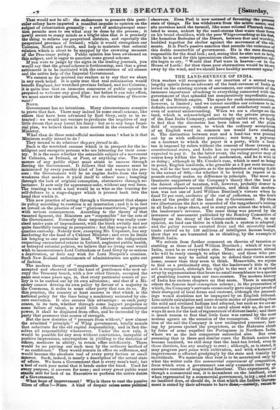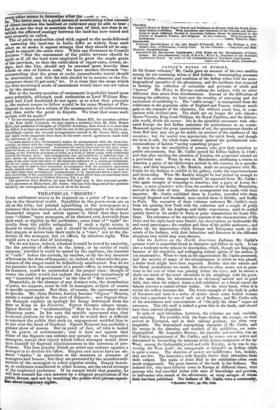THE LAND-REVENUE OF INDIA.
Oyu readers will recognize in our insertion of a second very lengthy epistle from an advocate of the land-revenue of India as levied on the existing system of assessment, our conviction of the immense importance attaching to everything connected with the government of that splendid but comparatively unprofitable por. tion of the British empire. The space for such communications, however, is limited ; and we cannot sacrifice our columns to la. definite controversy, without a prospect of satisfactory result e even of mutual understanding. When we see a charge on the land, which is acknowledged not to be the private property of the East India Company, unhesitatingly called rent, we begm to feel that the discussion has been taken out of the plain field of common sense, to which the ordinary acceptation of an English word in common use would have confined it. The distinction between rent and a land-tax was pointed out by us with sufficient precision ; rent being a payment on a contract to which the payer is a party, while a land. tax is imposed by rulers without the consent of those (except in constitutional states, and India has no representation) who are expected to pay it. In the latter event, the ruling power may of course keep within the bounds of moderation, and he is wise in so doing ; although in Mr. Crooke's case, which is used as being in point, English landlords, who grumble at a 3 per cent income- tax will be the best umpires as to the moderation of taxing 3" to the extent of 800,—for whether it be levied in rupees or in pounds sterling makes no difference in principle. The most en- thusiastic supporters of the Company's theory that the land is the fairest object of taxation' will, however, probably demur to our correspondent's second illustration, and think that modera- tion was not one of Lord William Bentinck's virtues when he fixed 75 per cent, exclusive of the cost of collection, as the lion's share of the profits of the land due to Government. By these two illustrations the fact is conceded of the taxgatherer's seizing in all India a large share, and in many parts almost the whole' of the landowner's revenue. The same thing was proved by the instances of assessment published by the Bombay Committee of Inquiry on the decay of the Cotton-cultivation. Now, in our opinion, no land can thrive in which such a system is adopted; and the paltry revenue extorted from and the miserably small trade carried on by 150 millions of intelligent human beings, show that we are warranted in so thinking, by the example of British India.
We refrain from further comment on theories of taxation so startling as those of Lord William Bentinck ; which if true in India, must be so everywhere else. There are reasoners abroad who will be ready enough to adopt them and those who pro- pound them may be called upon to defend their views nearer home, sooner than they seem to think. Meanwhile, we rejoice to find as a preliminary step, that the landowner's title to the soil is recognized, although his right to the rent of it is spirited away by argumentation that bears no small resemblance to a species of gambling known upon our race-courses. The modern history of India has curious chapters on that score. There is amongst others the famous land-resumption scheme ; in the prosecution of which, the Company's servants occasionally gave singular proofs of their disregard of local forms and customs, although the proceed- ings would doubtless not be impugned by an English tribunal. Less subtile calculation and more drastic modes of proceeding than the mild and civilized Indians had adopted, but such as we are ac- customed to in Europe and like to carry about with us, do not al- ways fit men for the task of regenerators of distant lands ; and there is much reason to fear that little fame was earned by the most zealous agents on the occasion of the resumption. Of this por- tion of the soil the Company is now undisputed possessor; hav- ing by process ejected the proprietors, as the IVIahratta chiefs by force of arms expelled the Portuguese in Northern India, where we as the last conquerors succeeded also. But even assuming that in these and similar cases the British nation has become landlord, we still deny that the land-tax levied, even in those districts, has any analogy to rent ; although, as is stated, it may progress pari passe with cultivation and with whatever of improvement is effected grudgingly by the state and timidly by individuals. We maintain that rent is to be ascertained only by what the writer calls the commercial experiment of competition, from which even a government can only exonerate itself by an excessive exercise of magisterial functions. This experiment, al- though a commercial one, it is incumbent on the landlord, even when represented by a commercial government, to try ; and what no landlord does, or should do, is that which the Indian Govern- ment is stated by their advocate to have done,—namely, resort to every other means to determine what the ...we be The latter may be a good means of ascertaining what amount of direct taxation the landlord or cultivator may be able to bear ; but it is not the way to ascertain the rent of land, nor does it es- tablish the affirmed analogy between the land-tax now raised and rent properly so called. The ex parte authorities cited with regard to the mode followed in assessing the land-tax in India differ so widely from each other as to make it appear strange that they should all be sup-
to support the same view. While one Governor in Council
eclares "that the assessment of the public revenue should be made as if all the land were employed to grow the staple grain of the province, so that the cultivation of sugar-cane, cotton, in- digo, and the like, should not be assessed more heavily than wheat or rice or Indian corn," we have another Governor "re- commending that the gross or cucha jummabundee rental should be ascertained, and that the rule should be to assume as the Go- vernment share 75 per cent," Ste. It is clear that the crops which the first-mentioned mode of assessment would leave out are taken in by the second.
But as the knotty question of assessment is probably based upon some principle although such authorities as Lord William Ben- tinck and Lord Auokland do not agree as to what that principle is, the easiest course to follow would be for some Member of Par- liament to move for a return of the assessments in all collectorates, and thus settle the point in dispute. We trust that some such motion will be made.*
• To our correspondent's quotation from Mr. James Mill, the quondam adviser of the East India Company, we may oppose a quotation from Mr. John Stuart Mill's just published Principles of Political Economy; from which it is clear that the father mat least no authority with the 13011 in this particular, for the latter un- hesitatingly rejects the revenue arrangements current in Mr. James Mill's time, and lands every departure from them in the more recent agreements made with the cultivators of the soil.
"In some places it jthe Government] makes its arrangements with the ryota indi- vidually, in others with the village communities, leaving them to apportion the demand according to usage or agreement. Sometimes the rent Is fixed only for one year, some- times for three, or five; but the tendency of recent policy is towards long leases, ex- tending, in the Northern provinces of India, to a term of thirty years. with conditional renewal for twenty more. This arrangement has not existed for a sufficient time to have shown by experience how far the motives which the long lease creates in the minds of the cultivators fall short of the beneficial Influence of a perpetual settlement. But the two plans, of annual settlements and of short leases, are irrevocably condemned. They can only be said to have succeeded in comparison with the unlimited oppression which existed before. They are approved by nobody, and were never looked upon in any other light than as temporary arrangements, to be abandoned when a more com- plete knowledge of the capabilities of the country should afford data for something more permanent."—Principles of Political Economy, vol. I. p. 380. The quotation from Malthus we may well hand over to that reverend gentle- man's successor at Haileybury, Mr. Jones; who has fully disposed of the question raised by our correspondent, and not at all in his favour.



























 Previous page
Previous page